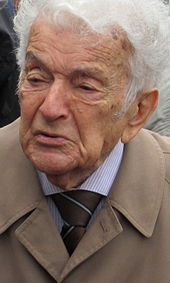Alfred Schreyer
Alfred Schreyer (born May 8, 1922 in Drohobycz , then Poland ; † April 25, 2015 in Warsaw ) was a Polish singer and violinist . He was a Holocaust survivor .
Life
Childhood and youth
Alfred Schreyer was born in the small Galician town of Drohobycz. His father Benno was a chemist at the Austrian company Gartenberg & Schreyer, his mother Leontina a pharmacist. The family lived in one of their grandparents' houses.
At the state König-Władysław-Jagiełło-Gymnasium Schreyer was a student of Bruno Schulz , who taught drawing and handicrafts there.
First German occupation in 1939
In September 1939, Drohobycz was captured by the Wehrmacht during the attack on Poland . Shortly afterwards, Schreyer witnessed how the German occupiers had the rabbi sweep the street on Rosh Hashanah , the Jewish New Year's Day.
Soviet occupation 1939–1941
In October 1939, Eastern Poland was occupied by the Soviets . Shortly afterwards, the pupil Schreyer had to watch the Soviet secret police , assisted by two of his schoolmates, pick up the director Tadeusz Kaniowski. The school principal was formerly a senator of the Republic of Poland. “For people like him, for senators, there was only room in Kazakhstan. His grave is there, ”says Schreyer. The family lost their house and Alfred's father had to work in the paraffin factory. From the first eighty rubles that Alfred earned as a member of a vocal quartet performing before a Soviet cultural brigade, he bought his father boots for the very wet work in the paraffin factory.
Second German occupation in 1941
After the start of the German-Soviet War in June 1941, Drohobycz became part of the Galicia District in the Generalgouvernement . The German occupiers set up the Drohobych ghetto , in which Schreyer also ended up. About the strikingly large number of Austrians among the Gestapo people , he says: "These Viennese were a shock to me."
In 1942 Schreyer was sent to a forced labor camp for the first time, where he worked in the carpentry shop. After this camp was closed in 1943, he and other “useful ones” were brought to a camp at Karpaten Öl AG .
He was then transferred to the Kraków-Plaszow concentration camp, where he arrived on April 14, 1944. "But this hell was just limbo compared to what was to come," says Schreyer. In October 1944 he went on to Gross-Rosen , where the last memory of his mother, the photo with her writing on it, was taken from him. On November 4, 1944, he was transferred to the Buchenwald concentration camp in Block 59. He was then transferred to a subcamp in Taucha near Leipzig, to a bazooka factory. About the end of his stay in the concentration camp, Schreyer says: “Until April 6, 1945, we were evacuated. I only weighed 39 kilos, had water in my legs and was a living corpse, a 'Muselmane' ”. On the march he ran into a group of German prisoners. A fellow inmate said softly, “Watch out!” And pushed him into the ditch. Schreyer: “That was my salvation.” After a few hours he was taken to the next village by a Hitler Youth on a bicycle.
Alfred Schreyer's father died at the beginning of August 1942 together with around 5,000 Jews from Drohobycz in the Belzec extermination camp . His mother escaped from a transport to Belzec and was shot a little later in the Bronitz Forest with around 11,000 other Jews and buried in a mass grave.
After the war
Schreyer initially found a job as an interpreter in the trade department of the Soviet troops in Saxony. In autumn 1946 he was "repatriated" and came back to Drohobycz via Belarus. There he kept himself afloat by playing the violin and began to study again. On January 5, 1949, he married his wife Ludmilla. His two children have lived in Germany since 1993; his wife died a few years before him.
Until shortly before his death, Alfred Schreyer still lived in Drohobycz; he was the last Jew in this town to be born before World War II.
On the occasion of his 90th birthday, Alfred Schreyer was awarded the highest Polish award for cultural workers, the Gloria Artis Medal for Cultural Merit in Gold (Złoty Medal “Zasłużony Kulturze Gloria Artis”) by the Polish Minister of Culture . This award recognizes his efforts to disseminate and preserve Polish culture at home and abroad.
Movie
- Paul Rosdy: The last Jew from Drohobycz . Vienna 2011
Web links
- Alfred Schreyer in the Internet Movie Database (English)
Individual evidence
- ↑ Zmarł Alfred Schreyer, uczeń Brunona Schulza, ostatni Żyd Drohobycza. Jeździł do niego cały świat
- ↑ a b I was always Schreyer. Welt Online January 30, 2007. Retrieved October 10, 2011
- ↑ a b How did you survive the war, Herr Schreyer? In: FAZ May 14, 2010, accessed on February 26, 2015.
- ↑ Mr. Schreyer, not No. 56001 . In: Zeit Online, April 19, 2001, accessed October 10, 2011.
- ↑ Austrian Film Commission: The Last Jew from Drohobycz ( Memento from January 14, 2013 in the web archive archive.today )
- ↑ http://www.derletztjude.com
| personal data | |
|---|---|
| SURNAME | Schreyer, Alfred |
| BRIEF DESCRIPTION | Polish musician |
| DATE OF BIRTH | May 8, 1922 |
| PLACE OF BIRTH | Drohobycz , Poland |
| DATE OF DEATH | April 25, 2015 |
| Place of death | Warsaw |
